Revolution to reform: The long and arduous path to lasting democratic change

Bangladesh's recent transition of power, albeit long overdue, triggers troubling questions about what led us to this point. The fact that the police, paramilitary forces and other security personnel could be used to brutally shoot at unarmed student protesters, that the judiciary failed to intervene, and that a number of media institutions were complicit in peddling state-sanctioned propaganda, laid bare the deeply eroded democratic institutions in our country.
The question of how we harness the energy from a successful people's movement to engender lasting reforms to our democracy, preventing future misuses and abuses of power of this magnitude, but more importantly enabling a democratic, just and modern Bangladesh that we can all be proud of, therefore remains paramount. In other words, the much sought-after alternative (or "bilokpo") is not about (a set of) people or any particular political party, but rather a set of institutions and processes that people can trust and rely on to protect the public interest and their rights even under the worst of leaders.
As important as this reform agenda is, it is equally important to follow due process in consultation with the constitution in each step towards achieving these reforms, or else we would risk our rebirth being on the back of a shaky foundation.
A constitutionally-sanctioned path to an interim government
Although it is yet to be publicly available, Sheikh Hasina's resignation has opened numerous debates on the formation of an interim government. Following countless hours of meetings, Prof. Muhammad Yunus was selected to be the Chief Adviser of the interim government. This was a welcome announcement amidst all the uncertainty and instability, since the power vacuum and disorder in the immediate aftermath of the resignation continues to be ripe for exploitation by opportunistic forces—including the starving opposition, ambitious factions within the armed forces, or foreign interests—and there has been ongoing violence against minority communities. It remains urgent to complete the formal handover of power, since the current vacuum could still be used by the military to take over using a proclamation of emergency by invoking Article 141A of the constitution, an outcome that must be avoided at all costs.
However, given the many wounds inflicted on the constitution over the past three decades of a fraught democracy, the constitution-respecting, yet viable and just, path to the formation of this interim government remains unclear.
The Constitution (15th Amendment) Act 2011, introduced by the Awami League government, removed the provision for a caretaker government. Given the many controversies and irregularities surrounding it, the first best option would be to carefully review the relevant court rulings by constitutional experts to confirm its full interpretation. In the absence of such due diligence, arguing that this "interim" government is materially different from the previous iterations of "caretaker" governments may prove difficult.
Assuming this is not realistic, another possible way forward is through a President's Ordinance that ushers in the interim government with clarifications on term limits, scope of governance, and rule-making powers. However, this poses the risk of being overturned, and the process deemed unconstitutional, by the next elected parliament.
Another approach, which may also be used to legally "button up" the option above, may be to introduce a referendum to gain public support in formulating an interim government that will be tasked to hold a credible election under Article 119(2), followed by a ratification by the Appellate Division arguing doctrine of necessity under Article 106. In this regard, it may be argued that initiating a referendum is not materially "altering or repealing" any parts of the Constitution, but merely adding to it.
Regardless of which path is chosen, it is extremely important that it is accomplished in a way that cannot be challenged in court, delegitimising the "interim" government, and creating another power vacuum and associated instability before it can fulfil its duty of organising a free and fair election. Secondly, the committee of constitutional experts charged with this process must be very careful, as this sets precedent for the next few decades of democracy and governance in Bangladesh. A third, more ideological argument ties to the movement's spirit of re-establishing rule of law and strengthening democratic institutions in the country. Therefore, it is incumbent upon decision makers to ensure that the first step towards a renewed Bangladesh must show commensurate respect for the rule of law, which includes the prevailing, however dysfunctional, constitution.
Further roadblocks to a free and fair election
Even if we find a constitutional path forward towards establishing an interim government, there are still risks. The Bangladeshi public has had bitter experiences in the past with a caretaker government staying beyond its term. To tackle these risks, it is important that there are clear, procedural safeguards to ensure credibility of the government, and a time-bound transition of power. These safeguards include ensuring that the government consists of competent civilian advisors without political ambitions, whose nomination and selection is done through a transparent and publicly acceptable process, and not dictated by the military or political parties. It is necessary that the president and his advisers consult with a broad range of non-state stakeholders, in addition to student representatives and political constituencies, for transparency and widespread acceptance.
As if all these hurdles were not enough, perhaps the most difficult challenge comes from ongoing debates around the interim government's term limit. Undoubtedly, a period of 90 or 120 days from the dissolution of the parliament is insufficient for an election to be held, especially against the backdrop of systematically dismantled and co-opted institutions.
Some, including the student representatives, suggest a term limit of three to six years, while others have recommended a term limit of up to one year, and no more than two. The former argue that three to six years is needed to create new or renewed political leadership that provides the public with options during polls, as well as necessary institutional reform across all sectors.
Critics of a longer-term limit for an interim government have flagged the risks of it undermining democratic norms, being deemed unconstitutional and their decisions overturned by a future elected parliament, limitations in rulemaking powers to create lasting reforms, and a lack of mandate for public accountability that is necessary for effective and transparent governance. An unelected interim government also exists against the backdrop of possible military co-option, which could destabilise our aspirations and sacrifice for democracy and rule of law.
Even if the doctrine of necessity, or a referendum, or both, are used to extend the term limit, one must remember that it sets legal precedence and must be fool-proof from current or future challenges in court.
Accountability of perpetrators
While there are widespread calls for justice, including the need for an interim government to ensure an independent court tries perpetrators of violence against students and civilians, it is unlikely a fair trial will succeed under a non-independent judiciary. Therefore, a key task of the interim government could be facilitating a fact-finding process through the United Nation (UN)'s transitional justice framework. The recently announced citizen-led inquiry commission could act as a "truth and reconciliation commission" with UN support to ensure transparency and international standards.
This fact-finding process can pave the way for substantive criminal justice reform under a future-elected government, ensuring transparency and accountability with evidence permissible in court.
Constitutional reform and beyond
However, even with a free and fair democratic election, lasting reform is unlikely to materialise if our painful political history of betrayals is any indication. For this reason, the framework and process for a fundamental constitutional reform must be outlined and agreed on through robust public consultations during the period of the interim government, with its ratification mandated as the first task of the new elected government (a better alternative might have been to ratify the constitutional amendment through a national referendum, but our current constitutional framework does not allow for it). This must be a thorough process which reverses the crippling changes made by the 15th and 16th amendments, including elimination of the widely debated Article 70, that restricts voting freedom for parliament members, protection and freedoms to organise and register new political parties, deliberation around a two-layered parliament with proportional representation in one of the houses to provide additional cushion against future constitutional encroachments, decentralisation of power effectively to regional and local constituencies, re-establishment of the independence and separation between the judiciary, executive and legislative branches of government, guarantees to safeguard human rights and freedom of expression for all including political oppositions and ethnic/religious minorities, and imposition of term limits for party and national leadership.
This process, under the future-elected government, must include public consultations, and deeply study and learn from the successes and failures of similar reform processes in other countries such as Chile, Lebanon, Kenya and Tunisia, and from our own country's chequered history.
However, even the most well thought out constitutional reforms are ultimately not enough. If there's anything this painful and dark chapter of Bangladesh's history has taught us, we must always be vigilant and courageous against those in power, and always keep our representatives in check. If we look around, examples abound of revolutionaries turned dictators. It is only a politically aware and vocal electorate, and systems that nurture the health of that polity, that can protect against a future tyrant. That fundamental shift in mindset in each and every citizen, is the ultimate reform we must all work towards and aspire to.
Rubayat Khan is co-founder of Jagoree, a citizen's activism platform. Sabhanaz Rashid Diya is a Visiting Policy Fellow at University of Oxford. Shahzeb Mahmood is a researcher at University of New South Wales.
Views expressed in this article are the authors' own.
Follow The Daily Star Opinion on Facebook for the latest opinions, commentaries and analyses by experts and professionals. To contribute your article or letter to The Daily Star Opinion, see our guidelines for submission.

 For all latest news, follow The Daily Star's Google News channel.
For all latest news, follow The Daily Star's Google News channel. 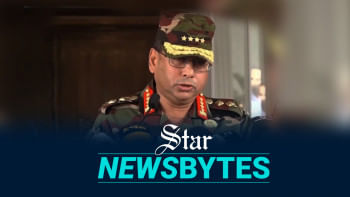
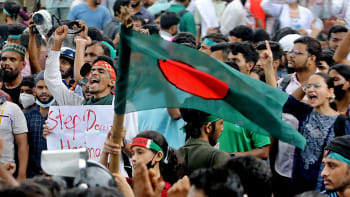
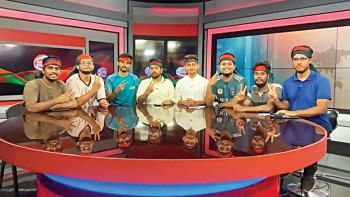


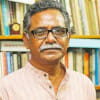


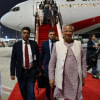



Comments